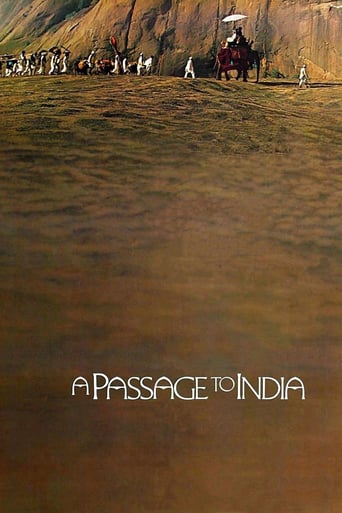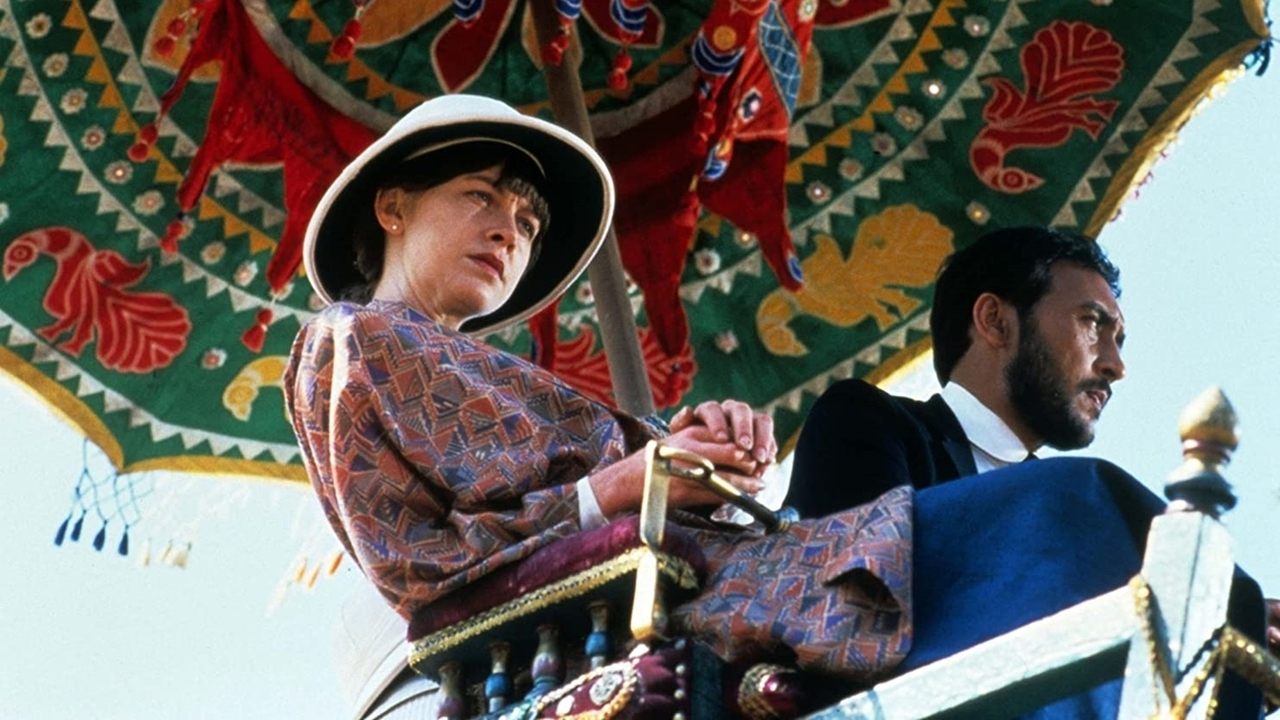vincentlynch-moonoi
I identify quite a bit with this film. I've never been to India, but beginning in the mid-1980s I began frequent long summers in Thailand, and then lived there for a couple of years after retirement. Some of the same themes I see in this film I confronted in Thailand. You might think that odd since we are talking about almost a century apart from the novel and my travels, but the feeling not at home in a different culture could sometimes be pervasive. Being looked at as a foreigner was a common theme. And I often got off the beaten path and visited some pretty remote places...often alone...and a few times I felt sort of like the character Adela when she visited the overgrown Indian temple and was frightened by the monkeys.To begin with, this is one of those marvelous tales told by one of filmdom's greatest directors -- David Lean. It is, perhaps, not as ground breaking as "Dr. Zhivago" or "Lawrence Of Arabia", but it surpasses all his other films due to the haunting story so well told and the exquisite photography.It's a rare story that has so many interesting characters. The most interesting is Mrs. Moore, as played by Peggy Ashcroft. She is one of two characters in the story/film who seem to have a gut understanding of India and the unfairness of the British occupation. As Professor Godbole says, Mrs. Moore is a very old soul, and implies that in a former life she may very well have lived in India. Ashcroft is wonderful in this film! And, to a degree, the entire plot of the story revolves around her...even in death.The other character who understands things as Mrs. Moore does is Richard Fielding, as played by James Fox, the teacher. He doesn't hold to the strict class lines in the India of the time. I've always enjoyed Fox's roles in film, and this is certainly no exception.The third most interesting character is Dr. Aziz Ahmed, as played by Victor Banerjee. Ahmed, a doctor of the Muslim faith, is torn between disliking the British, and being open to them and their culture. He is particularly drawn to Mrs. Moore. Banerje is excellent here, as well.I wasn't overly impressed with Judy Davis, the young lady who has the breakdown in the caves, but she played the role satisfactorily.The one casting I disagree with here is of Alec Guinness as the weird Professor Godbole, a Hindu. Guinness does a fine job with the role...actually quite amusing, but why did David Lean have to cast a White person when there are so many talented Indian actors? Of course, the answer is that Lean and Guinness go way back. But I still think it was a poor casting choice.Nigel Havers does nicely as the Brit with the stiff upper lip as he is jilted twice. He is key to understanding the attitude problem the British had toward the Indians.Clive Swift was great at being the stone-faced British official...but we had no idea whether he had any actual acting ability. Ann Firbank, who played his wife, was better at being upper class snooty British.This film is, quite simply, a masterpiece of film-making.
TheLittleSongbird
Rewatching A Passage to India after a few years, it is not one of my favourite David Lean films like Lawrence of Arabia, Great Expectations, Bridge on the River Kwai, Brief Encounter and Oliver Twist are, but for a swansong of a great director (one of my personal favourites actually) it's a very good one, but I do remember liking it more on first watch.A Passage to India is not perfect, it ends anti-climactically and parts feel overlong and stretched with some drifting storytelling. This is also a rare case where the normally great Alec Guiness felt wasted and miscast, he never convinces in his very underwritten role and the performance is filled with uncharacteristically over-stated mannerisms.However, Lean directs superbly and the film is lavishly made with typically luscious cinematography, lavish period detail and some of the most gorgeously evocative scenery of any Lean film (in a filmography of films filled with gorgeous scenery). Maurice Jarre's music score has been criticised for being an ill-fit, for me while lacking the Indian flavour and a tad too jaunty in the credits it is sumptuously scored, soaringly epic, sounds glorious and evokes a lot of emotion. The script is literate and very beautifully written, capturing the essence of Forster's writing while not feeling overly wordy or heavy, while the story is rich in atmosphere and explores the important themes of colonialism, relationships between cultures and the British Empire and its imperialism in a subtle but powerful way.The film has been criticised for its pacing, and while there are a few draggy moments due to a few scenes feeling too stretched the main reason for the deliberate pacing was most likely for the viewer to soak up the setting and its atmosphere, A Passage to India does this brilliantly (and this is true for Lean's work in general as well). The part covering the trial is mostly fantastic but could have been longer, and the characters and their interactions are fascinating and well-realised. The acting is truly excellent, Peggy Ashcroft rightfully won an Oscar for her divine performance (especially in the temple scene) and Judy Davis is every bit her equal in a difficult but impulsively and movingly played performance. James Fox is remarkably thoughtful and sympathetic in his role, and Victor Banerjee gives his caricature role a real expressivity.Overall, a very good swansong from Lean and a very good film. 7.5/10 Bethany Cox
petra_ste
Forster has been lucky as far as movie adaptations of his works are concerned. James Ivory did him justice with A Room with a View and especially with the magnificent Howards End, and having your most successful book handled by David Lean is something every novelist would envy.A feast for the eyes - with damp jungles, peaks shrouded in clouds and crystal-blue lakes reflecting the sky like polished mirrors - the movie is a tale of social, racial and sexual tension, as in colonial India a British lady (wrongly) accuses a local doctor of attacking her during a visit to an isolated archaeological site.The female protagonists fare better than their male counterparts. Judy Davis is phenomenal in the lead role of Adela Quested - a nuanced, powerful portrayal of a psychologically distressed individual. Ashcroft is also excellent as Mrs Moore.Banerjee succeeds at making doctor Aziz likable, but it isn't exactly a subtle performance: he appears too childlike, naive and eager to please. Only in the epilogue some much needed bitterness comes through and paints the doctor as something deeper than a saintly scapegoat. More on target is James Fox as the British educator who sides with Aziz against his own compatriots. Alec Guinness, great as he was, is miscast as a Brahmin.Not one of Lean's best works, but still compelling and visually rich.7/10; for a different take (less political, more esoteric) on similar themes - sexual repression, conflict between nature and civilization - see also Peter Weir's Picnic at Hanging Rock.
grantss
Interesting story with wonderful cinematography.Set in India in the 1920s, this is a story of cultural intolerance, acceptance and reconciliation. Not the usual patronising films of the past set in India. Much more balanced, and, if anything, the English come out looking like the bad guys.Stunning scenery and great cinematography.Plot builds slowly. Once the key scene occurs the movie is set up for a great tale of justice, or injustice. However, despite the potential, these themes are just touched on and are concluded rather tamely. Ending feels a bit muddled and anti-climactic. So, good, but could have been a lot better, especially since the story takes so long to be told.



 AD
AD



